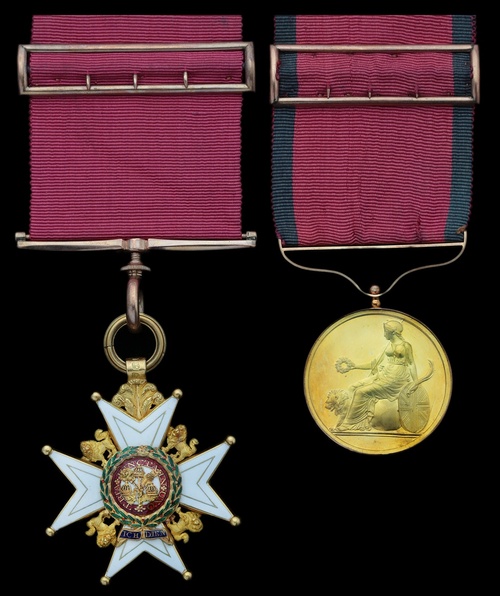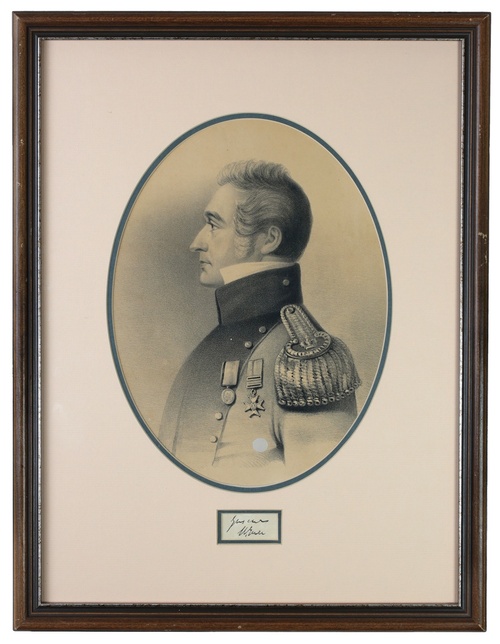Auction: 22002 - Orders, Decorations and Medals
Lot: 51
Sold by Order of a Direct Descendant
'Lieutenant-General Sir Samuel Auchmuty has it in command from His Royal Highness the Prince Regent to convey in public orders and in the strongest terms to the troops who achieved the conquest of Java, His Royal Highness's approbation of the distinguished gallantry & spirit displayed by them during a succession of the most brilliant operations , and in particular on the 26th of August, when the enemy's entrenchments were assaulted and carried, and their army defeated and destroyed.
… the Lieutenant-General cannot refuse the assailants at Cornelis the satisfaction of knowing that His Royal Highness the Prince Regent has graciously announced his intention of bestowing Medals on the Superior Officers of His Majesty's and the Honourable Company's Forces who distinguished themselves on that memorable service.'
General Order, Commander-in-Chief Madras, 12 May 1812
A rare 1815 C.B. and Army Small Gold Medal awarded to Major Udney Yule, Honourable East India Company's Army, for his participation in the Invasion of Java in 1811
The Most Honourable Order of the Bath, C.B. (Military) Companion's Breast Badge, 18 carat gold and enamels, hallmarks for London 1815, with gold buckle and likely on original riband; Field Officer's Small Army Gold Medal, for Java (Major Udney Yule, Bengal Estabt.), with glazed lunettes, gold buckle, about extremely fine, (2)
Udny Yule was the youngest son of George Yule of Gibslees, East Lothian, and his wife Elizabeth, née Rose - daughter of the Episcopal minister of the parish of Udny in Aberdeenshire. His family had been tenant farmers and small landowners in East Lothian since the late 16th century and many generations of Yules served in the British and East India Company armed forces from the 18th to the 20th centuries.
Yule was born on 17 April 1766 and baptised in Dirleton, East Lothian, six days later. Like many Scots of his background - educated but of modest means - he was destined for an East India Company cadetship, which he acquired in December 1782. Three months later, he sailed from Portsmouth in the Indiaman Duke of Kingston (Captain Justinian Nutt) but she caught fire off northern Ceylon on 20 August 1783 and sank with the loss of three passengers, 22 crew and 40 soldiers, women and children of the 52nd Foot. Yule, it is recorded, 'contrived to remain afloat' until rescued by a passing ship and taken to Mauritius, whence he recommenced his journey to India. His cadetship in the Company's Bengal army led to his appointment as Ensign in 1785, being posted to Bengal's 2nd European Battalion in 1790 and being promoted Lieutenant in 1793. Promoted Quartermaster and Captain in the 20th (Marine) Bengal Native Infantry in 1803; he returned home on four years' furlough in 1805, being promoted Major in 1st/20th while on leave in 1808.
In the summer of 1811, Yule served at the capture of Java, which - formerly a Dutch colony - had become an outpost of France in the East Indies. Once Batavia, the capital, had capitulated without a fight, Fort Cornelis was the target of the British assault force. This fort was the most serious impediment to British control of Java, and its French and Dutch garrison put up stiff resistance before the fort was successfully stormed on 26 August 1811: both defenders and attackers sustained considerable casualties. In the British Order of Battle for the invasion of Java, Yule was commanding officer of the Flank Battalion of the Reserve. However, for the assault on Fort Cornelis he was given his own 'all-arms' column and detailed to mount a diversionary attack on the rear of the Fort while the main assault went in on its front: as ever in battle, all did not go according to plan…
…Major Yule, with the flank corps of the Reserve, reinforced by two troops of cavalry, 4 guns of horse artillery, two companies of the 69th and the grenadiers of the Reserve, was directed to attack the corps at Campong Malayo, on the west of the great river, and endeavour to cross the bridge at that post. Major Yule's attack was…spirited, but after routing the enemy's force at Campong Malayo, and killing many of them, he found the bridge on fire and was unable to penetrate further.'
Despatch: Lieutenant-General Sir Samuel Auchmuty, commander of the forces in Java, to His Excellency the Earl of Minto, Governor-General of Bengal, 31st August 1811
As Thorn, the historian of the campaign (in which he served as a staff officer), wrote in 1815, ' … the troops employed [at Campong Malayo] were obliged to content themselves with firing their…six-pounders across the river, by which the enemy were excessively annoyed in their retreat.'
Although thwarted by the firing of a bridge, Yule's efforts were sufficient to attract notice and an appropriate mention in a General Order issued by Auchmuty on 29th August 1811:
The full success of the several attacks led by Colonel Wood of the Bengal Native Infantry, by Lt. Col McLeod of the 69th Regiment…[and] by Major Yule of the 20th Regiment Bengal Native Infantry - attacks expected only to distract & divide the attention of the Enemy - is the best proof of the ability & energy with which those Officers conducted the divisions entrusted to their charge.
The pacification of Java was completed a month after the fall of Fort Cornelis and Yule continued to be involved, as Auchmuty wrote in a despatch to Minto on 21st September 1811:
I have sent a small detachment under Major Yule, of the 20th Bengal regiment, an officer on whose conduct I have much reliance, to accompany the Prince of Samanap and his force to the island of Madura, where I have directed the Major to assume command…;he has been instructed to occupy the small forts of Joanna and Rambang on his route…
Yule was promoted Lieutenant-Colonel in the 11th Bengal Native Infantry in 1814, transferring to the 1st/24th Bengal Native Infantry in 1815 and to the Bengal European Regiment in 1816. On 4 June 1815 he was created one of the first Companions of the Order of the Bath upon its' enlargement from a single-class Order. He may have remained in Java since he is said to have been commanding the forces at Bantam, in western Java, before taking four years' furlough in 1818. While at home, in 1821, he took time to matriculate his Arms at the Court of the Lord Lyon in Edinburgh. Returning to India in 1822, he joined the 10th Bengal Native Infantry before, in 1823, being appointed Lieutenant-Colonel commandant of the 40th Bengal Native Infantry. He left India for the last time on furlough in 1824, being transferred in his absence to the 18th Bengal Native Infantry in 1828 and promoted Colonel in 1829.
Colonel Udny Yule died, unmarried, in Edinburgh on 4 March 1830. He now lies, with generations of his ancestors and descendants, in the chancel of the ruined Norman church at Gullane, East Lothian. Some of his correspondence forms part of the Yule family papers in the British Library (Add Ms Eur E357).
The Awards which comprise this Lot are accompanied by a finely-detailed quarter-length, engraved, black-and-white portrait in profile of the recipient, wearing military uniform and both Awards above an original ink signature, the whole in a recently-mounted and glazed frame measuring 375mm x 490mm.
Subject to 20% VAT on Buyer’s Premium. For more information please view Terms and Conditions for Buyers.
Sold for
£27,000
Starting price
£12000







